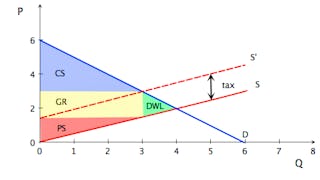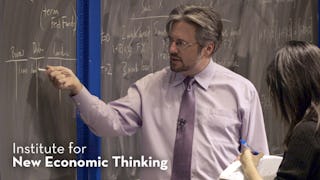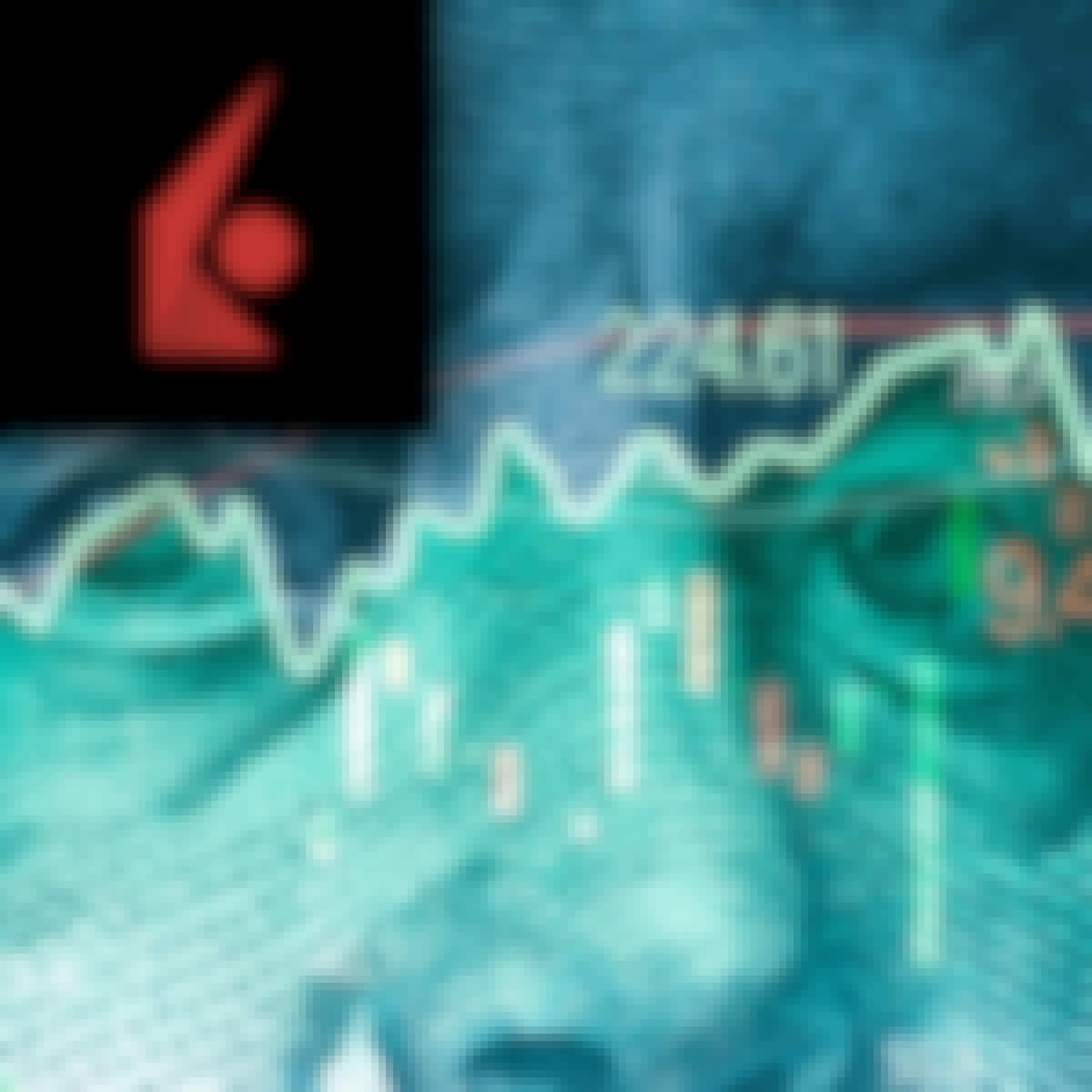- Browse
- Macroeconomics
Macroeconomics Courses Online
Study macroeconomics for understanding economic systems. Learn about economic indicators, fiscal policy, and monetary theory.
Filter by
SubjectRequired *
LanguageRequired *
The language used throughout the course, in both instruction and assessments.
Learning ProductRequired *
LevelRequired *
DurationRequired *
SkillsRequired *
SubtitlesRequired *
EducatorRequired *
Explore the Macroeconomics Course Catalog
 Status: Free TrialFree TrialR
Status: Free TrialFree TrialRRice University
Skills you'll gain: Economics, Supply And Demand, Economic Development, Financial Policy, Market Dynamics, Business Economics, Business Metrics, Public Policies, Performance Metric, International Finance, Fiscal Management, Investments, Labor Relations, Financial Market, Financial Regulations
4.8·Rating, 4.8 out of 5 stars61 reviewsBeginner · Course · 1 - 3 Months
 Status: PreviewPreviewU
Status: PreviewPreviewUUniversity of Pennsylvania
Skills you'll gain: Supply And Demand, Economics, Market Dynamics, Market Analysis, Resource Allocation, Policy Analysis, Tax, Consumer Behaviour, Cost Benefit Analysis, Decision Making
4.7·Rating, 4.7 out of 5 stars1.6K reviewsMixed · Course · 1 - 3 Months
 Status: PreviewPreviewO
Status: PreviewPreviewOO.P. Jindal Global University
Skills you'll gain: Economics, Economic Development, International Finance, Financial Policy, Business Economics, Supply And Demand, Socioeconomics, Fiscal Management, Policy Analysis, Public Policies, Market Dynamics, Accounting, Critical Thinking
Build toward a degree
4.6·Rating, 4.6 out of 5 stars9 reviewsBeginner · Course · 1 - 3 Months
 Status: Free TrialFree TrialU
Status: Free TrialFree TrialUUniversity of Illinois Urbana-Champaign
Skills you'll gain: Supply And Demand, Economics, Market Dynamics, Behavioral Economics, Resource Allocation, Socioeconomics, Consumer Behaviour, Cost Benefit Analysis, Decision Making, Critical Thinking
4.8·Rating, 4.8 out of 5 stars3.3K reviewsBeginner · Course · 1 - 4 Weeks
 Status: Free TrialFree TrialF
Status: Free TrialFree TrialFFundação Instituto de Administração
Skills you'll gain: International Finance, Business Economics, Economics, Market Dynamics, Business Planning, Business Strategy, Supply And Demand, Investments
Build toward a degree
4.8·Rating, 4.8 out of 5 stars445 reviewsBeginner · Course · 1 - 4 Weeks
 Status: PreviewPreviewC
Status: PreviewPreviewCColumbia University
Skills you'll gain: International Finance, Derivatives, Financial Systems, Balance Sheet, Financial Market, Payment Systems, Banking, Capital Markets, Economics, Market Liquidity, Financial Regulation, Finance, Market Dynamics
4.9·Rating, 4.9 out of 5 stars1.7K reviewsMixed · Course · 3 - 6 Months
What brings you to Coursera today?
 Status: PreviewPreviewY
Status: PreviewPreviewYYale University
Skills you'll gain: Behavioral Economics, Storytelling, Data Storytelling, Economics, Economic Development, Financial Forecasting, Forecasting, Socioeconomics, Social Studies, Consumer Behaviour, Analysis, Complex Problem Solving
4.8·Rating, 4.8 out of 5 stars857 reviewsBeginner · Course · 1 - 4 Weeks
 Status: Free TrialFree TrialU
Status: Free TrialFree TrialUUniversity of Illinois Urbana-Champaign
Skills you'll gain: Supply And Demand, Economics, Market Dynamics, Business Economics, Policy Analysis, Behavioral Economics, Business Operations, Price Negotiation, Socioeconomics, Consumer Behaviour, Economics, Policy, and Social Studies, Business Strategy, Public Policies, Competitive Analysis, Resource Allocation, Decision Making, Market Analysis, Cost Benefit Analysis, Environmental Issue, Critical Thinking
4.8·Rating, 4.8 out of 5 stars3.3K reviewsBeginner · Specialization · 1 - 3 Months
 Status: Free TrialFree TrialR
Status: Free TrialFree TrialRRice University
Skills you'll gain: Economics, Supply And Demand, Business Economics, Market Dynamics, Economic Development, Game Theory, Financial Policy, Tax, Market Analysis, International Relations, Operating Cost, Cost Benefit Analysis, Business Metrics, Public Policies, Performance Metric, International Finance, Fiscal Management, Consumer Behaviour, Investments, Labor Relations
4.8·Rating, 4.8 out of 5 stars134 reviewsBeginner · Specialization · 3 - 6 Months
 Status: Free TrialFree TrialU
Status: Free TrialFree TrialUUniversity of Illinois Urbana-Champaign
Skills you'll gain: Financial Policy, Economics, Financial Market, Financial Data, Banking, International Finance, Financial Regulation, Market Liquidity, Market Dynamics, Crisis Management
Build toward a degree
4.7·Rating, 4.7 out of 5 stars108 reviewsIntermediate · Course · 1 - 3 Months
 Status: Free TrialFree TrialI
Status: Free TrialFree TrialIInteractive Brokers
Skills you'll gain: Supply And Demand, Market Dynamics, Consumer Behaviour, Economics, Business Economics, Socioeconomics
4.8·Rating, 4.8 out of 5 stars18 reviewsBeginner · Course · 1 - 4 Weeks
 Status: Free TrialFree TrialI
Status: Free TrialFree TrialIIE Business School
Skills you'll gain: Financial Policy, International Finance, Public Policies, Economics, Economic Development, Economics, Policy, and Social Studies, Business Economics, Market Opportunities, International Relations, Tax, Global Marketing, Financial Trading, Policy Analysis, Socioeconomics, Demography, Business Risk Management, Crisis Management, Fiscal Management, World History, Supply And Demand
4.8·Rating, 4.8 out of 5 stars1.4K reviewsIntermediate · Specialization · 3 - 6 Months
Macroeconomics learners also search
In summary, here are 10 of our most popular macroeconomics courses
- Principles of Economics: Macroeconomics - The Big Picture: Rice University
- Microeconomics: The Power of Markets: University of Pennsylvania
- Macroeconomics: Foundations and Insights: O.P. Jindal Global University
- Microeconomics Principles: University of Illinois Urbana-Champaign
- Macroeconomics for Business Management: Fundação Instituto de Administração
- Economics of Money and Banking: Columbia University
- Narrative Economics: Yale University
- Microeconomics Principles: University of Illinois Urbana-Champaign
- A Story of Economics: A Principles Tale: Rice University
- Central Banks and Monetary Policy: University of Illinois Urbana-Champaign
Frequently Asked Questions about Macroeconomics
Macroeconomics is the field of economics that studies trends in the overall economy, whether at the level of a state, a country, or the entire world. In contrast to microeconomics, which studies the economic decision-making of individuals, macroeconomics examines how the aggregated decisions of all the individuals in an economy are shaped by large-scale factors such as interest rates, inflation, productivity, and tax and trade policies.
The importance of macroeconomics to understanding the business landscape has only grown in recent decades, as the march of globalization has made international economies ever more interdependent. Macroeconomic conditions within and between countries can create opportunities as well as challenges; for example, differences in labor costs or tariffs may enable a company to lower production costs with international supply chains.
Similarly, understanding macroeconomics is an important part of understanding national and international politics. Gross domestic product (GDP) growth is a core goal of any government, and economists play a central role in determining the macroeconomic policies needed to achieve this. Macroeconomic conditions in a country can also influence its positions in international trade negotiations as well as its motivations in cross-border conflicts or alliances.
Top decision-makers at large companies (and especially multinational corporations) rely on macroeconomic insights to aid in strategic management decisions. A chief operating officer (COOs) might use economic trends to inform demand forecasts; a chief financial officer (CFO) needs to keep a close eye on interest rates in evaluating different financing strategies; and a chief executive officer (CEO) could seek opportunities for expansion through overseas mergers & acquisitions (M&A) in a fast-growing emerging market.
Economists with a particularly deep expertise in macroeconomics may become academic researchers in some cases, or else may work in government roles. By using statistical and econometric techniques, economists can uncover new insights into the factors driving economic growth - and, potentially, provide guidance to policymakers accordingly. According to the Bureau of Labor Statistics, economists earned a median annual salary of $105,020 in 2019, and typically had at least a master’s degree and often a Ph.D. in economics.
Certainly. Coursera offers a full range of online learning opportunities on macroeconomics and related business topics such as financial markets, strategic management, and banking. These courses and Specializations are taught by top-ranked schools like the University of California, Irvine, Columbia University, and the University of Illinois at Urbana-Champaign, so you won’t have to settle for a lower quality education to learn online. And, with significantly lower tuition costs than on-campus students, learning about macroeconomics on Coursera is a smart investment in driving your own personal growth.
The field of macroeconomics draws on knowledge of larger markets and governmental policy, so experience in finance, accounting, investing, or banking will benefit you. The knowledge that involvement in the business field brings can also help you gain a grasp of basic macroeconomic concepts such as supply and demand and monetary policy. Having a familiarity with political science is also a plus when it comes to learning about macroeconomics because you’ll have a foundation of understanding about how government actions affect the markets. Experience with upper-level mathematics or statistics will also give you an advantage in studying macroeconomics because of the level of data analysis that macroeconomics involves.
Anyone with an analytical mind can perform well in a career in macroeconomics because jobs in that field often rely on modeling and financial analysis to determine trends and issue forecasts. Individuals with business experience, especially in larger corporations, are well-suited to work in macroeconomics roles because they have firsthand knowledge of how decision-making processes work in larger organizations, as well as how those decisions affect various groups of people. People with backgrounds in accounting can also understand the principles that drive macroeconomics, which prepares them well for careers in the field. Macroeconomics also sits at the junction of finance and politics, so people with an understanding of different forms of government and how they approach financial decisions often have the skills to excel in macroeconomics jobs.
A knowledge of macroeconomics is an excellent skill set for someone who wants to work with and analyze financial markets on a large scale. As government economic policies and multinational corporations have an increasing effect on the marketplace as a whole, macroeconomics expertise increasingly comes in handy for making business plans. The ability to understand and analyze economic data can help you identify trends and forecast future financial direction. Whether you're in the market for a new job or want to advance in your current workplace, learning the principles and applications of macroeconomics can help you improve your career in business and take advantage of opportunities to achieve greater success.
Online Macroeconomics courses offer a convenient and flexible way to enhance your knowledge or learn new Macroeconomics skills. Choose from a wide range of Macroeconomics courses offered by top universities and industry leaders tailored to various skill levels.
When looking to enhance your workforce's skills in Macroeconomics, it's crucial to select a course that aligns with their current abilities and learning objectives. Our Skills Dashboard is an invaluable tool for identifying skill gaps and choosing the most appropriate course for effective upskilling. For a comprehensive understanding of how our courses can benefit your employees, explore the enterprise solutions we offer. Discover more about our tailored programs at Coursera for Business here.










